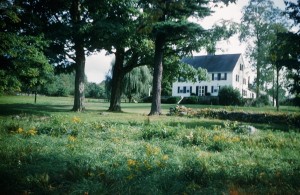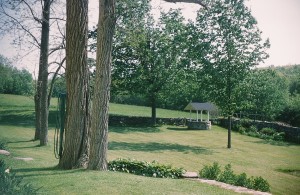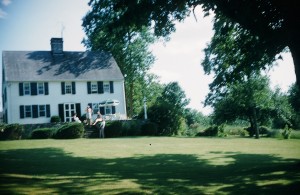Tom delivered the thunderbolt from the flagstones of Fair Hill in the heart of north-central Connecticut.

The guests would be leaving after lunch, which Josephine was preparing in the kitchen. Their belongings, including toys, were in the car, except for items left at the bottom of the wishing well. The sprinkler, no longer the main attraction of a homemade water park, was a boring old sprinkler again.
“What’s the hold-up, Jo!” Tom called out, while stroking his dog, who had brought him a forgotten kite.
Prior to impact, he would have offered his audience of two their favorite beverages: a cold Cremo for brother Frank and lemonade for sister-in-law Ann.
“We’re having Ham à la King,” he informed them with a wink.
The cat, which had been wrestling in the grass with a stick beyond the reach of the sprinkler, now went to say her goodbyes to the children. Frank’s transistor radio crackled in the background with avuncular play-by-play from Pittsburgh’s Forbes Field.
“Yankee go home!” cracked Tom after a play at the plate, trying again to generate some heat of sibling rivalry with Frank, who rooted for the team of his adopted city, the Pirates.
During the seventh-inning stretch, Tom announced, as if casually, “This property is ripe for development.”
“Oh?”
“According to a neighbor, the place could be turned into a golf course.”
“You are thinking of selling?! Fair Hill is sacrosanct!”
“Never say never. Who can’t picture a ball on its long descent toward the wishing well?”

“Wishing wells are for miniature golf courses.”
“Can’t you see a full 18, with views of the lake?”
“What does Jo think?” asked Ann.
“Jo would say the place should be left untouched. I’m not ready to rush into anything. The local children get the most out of it. Plenty of fresh air here!”
“Our children are playing in the basement,” Ann remarked, while defending the tomato aspic and rhubarb pie from flies. As if on cue, Jo came outside, clapped platter-sized domes of mosquito netting over the food, winked at Ann and disappeared back into the kitchen.
“Scaring each other, I’ll wager,” said Tom.
Light breezes and rustling leaves punctuated the Columbia afternoon.
“Jo wants a child.” Tom said suddenly.
No clashing of cymbals or fanfare of horn and drum accompanied this announcement, as the high school marching band had finished practice for the day.
“We feel Ruth could be very happy here,” he continued. “With us. Full time.”
Ann and Frank were not ones to fly off the handle. Frank gazed into his glass of Cremo on the chrome-edged table, until Ann, leaning forward in her glider, took a deep draught. To Jo’s way of thinking, Tom explained, Frank and Ann had Eleanor, their first-born, and therefore could part with Ruth, the younger daughter.
“With Ruth around, we would never think of selling. There would be no development, no golf course. Things would stay as they are.”
Ann, who sensed that Tom’s sales pitch was not over, began to distrust her senses upon seeing the house reflected in Jell-O.
Frank, facing the wishing well, thought to himself: “This rural air is healthier than Pittsburgh’s – no arguing with that. Bills would be smaller. The girls would not be in competition. There would be more trips to Forbes Field.”
“Tom,” Ann began, “your heart is in the right place.”
“Think of the coming bills,” Tom continued. “Clothing, ice cream, school books, piano lessons, etc. Two sets of cavities, two prom dresses, two college degrees, etc. Frank would not have to chaperone Ruth to singing engagements all over the ‘Burgh. Here, all of New York City would be our oyster!”
Continuing his reverie, Frank mused silently: “Golf has not been my game, but it could be, given the right circumstances. With my new clubs in the trunk of the Edsel, I would scour Western Pennsylvania for every last golf course, stopping on a whim for coffee in a greasy spoon or to see a small-town theatrical. From local papers, I would clip golf specials, which I would follow up in person like any sensible man, kicking autumn leaves before me. Before the first snow, I would turn south for the Carolinas, Pompano Beach and even Havana.”
About now, Frank’s shin, the one closest to the tips of Ann’s Oxfords, would have experienced a sharp pain, which may or may not have achieved its intended effect of dissolving a layer or two of his reverie.
“Tom!” Jo called from the kitchen.
“Coming, dear!”
Once the screen door slammed behind Tom, Ann, who had read her husband’s mind, exclaimed, ““Frank! How could you?!”
While Frank weighed his answer, Tom burst from the house bearing the main dish.
“Surprise!” said Tom. “Stockade Roast!”
There it stood on the table in all its glory, a Lincoln Log structure of franks built up around a roast like a fortress. Pimiento-stuffed green olives speared with toothpicks battened the walls and served as decoration along the parapet. Beads of tap water on the Iceberg Wedge Salad withstood for the time being the heat of the Stockade Roast and the sun.
“A roast for the adults, dogs for the kids!” laughed Tom, while straightening broccoli trees embedded in mashed potatoes piled like New England snow drifts (or Western PA ones, for that matter). “Call them. They’ll want to see this.”
“An experiment,” trilled Jo, flushed from the oven and nerves.

Ann, who disapproved of the radio during meals, switched off the ball game. Tom stood over the Stockade Roast, his eye following the line of the carving knife to define his approach to cutting portions.
“Seems a shame to ruin it.”